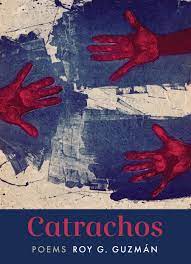ISSN: 1941-4137
POETRY THAT ENACTS THE ARTISTIC AND CREATIVE PURITY OF GLASS
POETRY THAT ENACTS THE ARTISTIC AND CREATIVE PURITY OF GLASS

J. David is a geneticist from Cleveland, Ohio. They edit Flypaper.
Photo Credit: Kenneth Jackson (Columbus, Ohio).
September 19, 2021
Edited by Stephanie Kaylor
Edited by Stephanie Kaylor
Against Silence: A Review of Catrachos by Roy Guzmán
 Catrachos
by Roy Guzmán
Graywolf Press , 2020
"Time blunts the crooked / to savage pews" ("Catrachos"), begins Roy Guzmán in their stunning collection, Catrachos (Graywolf Press, 2020) — a prescient interrogation of the systems of oppression against queer folks and people of color. Within, they name violence for what it is — that which effaces the self. Guzmán carefully examines the altars upon which we pray, not by direct implication of worship, but by coloring in the space around what we consider holy: family, community, and the body. It is these circumspect considerations which carry the most weight within the collection, as in the poem "Our Lady of Suyapa":
Catrachos
by Roy Guzmán
Graywolf Press , 2020
"Time blunts the crooked / to savage pews" ("Catrachos"), begins Roy Guzmán in their stunning collection, Catrachos (Graywolf Press, 2020) — a prescient interrogation of the systems of oppression against queer folks and people of color. Within, they name violence for what it is — that which effaces the self. Guzmán carefully examines the altars upon which we pray, not by direct implication of worship, but by coloring in the space around what we consider holy: family, community, and the body. It is these circumspect considerations which carry the most weight within the collection, as in the poem "Our Lady of Suyapa":…Before I believed in possession,
I learned when to vanquish the barbarous eyes of those who crave
universal forms — platonic adversaries. Anchored against the loss
of flesh, a hand or skeleton. I knew resurrection before I knew death,
identified the hazardous chemicals that equaled higher wages, my mother’s
lungs gone AWOL, a hacking in the meat sky, arid the reverberation…
When Cyclops holds whatever angle of immortality can perish
in issue #136 of Uncanny X-Men, we run into grief that aspires
to exist as nothing more than grief…
Though a book that takes many tangential approaches to interpreting the effects of violence, Guzmán does what many great documentarians have established as practice — sharp and moving lyricism tied with statements of fact meant to enact a visceral response to atrocities as well as implicate the reader ("Dia de los Muertos"):
Boy with deer knees like the mother I found dead one evening
on the side of the road under construction. What are we
witnesses to that implicates us insufficiently?
("Amor Eterno"):
…Homeless
with a father abroad —
because all our fathers dream
of misplacing us —
you asked for asylum,
died
before it was approved.
How many brown bodies will give up
their bodies
so other brown bodies
might live?
Guzmán recounts histories of trauma central to existing as a member of marginalized groups, utilizing recursive narratives and reappearing ideas and themes — such as that of a queer dinosaur dragging during the approach of the comet that led to their extinction, a series of poems separated into parts corresponding to the liturgies in mass, poems titled "Marrow" which depict the subliminal internalizations taking respite in our bones.
Also within the collection Guzmán elaborates on the violence stemming from a colonial religion and the implications of getting to tell your story, something not available to all members of marginalized groups, many of whom have had their histories erased ("Queerodactly"): "History is who buries / whom first. Mother all that burns / in holy water. What cradles. What deplumes." It is a powerful act that flies in the face of oppression to speak truth to power, to recreate narratives that seek healing and solidarity, and to continue a lineage of queer writing that will outlast the body.
Guzmán experiments with the queering of language throughout, intent on deconstructing a colonial lexicon used to induce violence. They repurpose it to build community around a queerness that has been attacked and Guzmán does well to include others in their experiences as a queer person coming of age. Guzmán is not wholly being focused on violence — there are moments of belonging and connection within the collection as well. These serve as a beacon to readers bogged down by the atrocities held within these pages.
The most important thing this collection does — something that will be a buoy to those reading the collection — is seeing the person behind the violence, not the person enacting it, but the person receiving it. The deepest desire of this book is to see that person as whole — "On our way to the bus / we will worship our bodies in hush" ("The American Dream").
Visit Roy Guzmán's Website
Visit Graywolf Press ' Website
Glass: A Journal of Poetry is published monthly by Glass Poetry Press.
All contents © the author.
All contents © the author.





